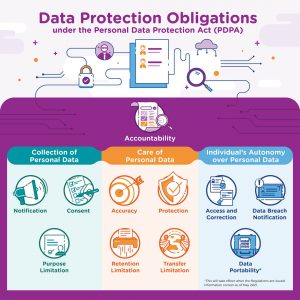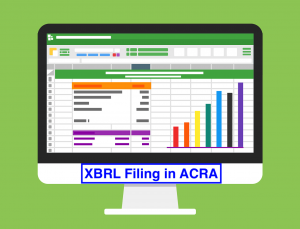Learn how to make changes to information of companies and officers. In Singapore, failing to update your business records can have three serious consequences: –

First, you can face fines of up to $50,000 or five years imprisonment, for false or misleading information (if you don�t update your records for several years, that may be interpreted as an attempt to lie; not just an administrative error).
Second, it can affect relations with suppliers or clients. Remember, many of them will pull your business profile from ACRA to check if you�re valid. You don�t want them to find out your manufacturing business is still defined as a retail business, because you didn�t update ACRA of the change for years.
Third, failure to update records can also complicate issues with IRAS. For example, say you�re due to receive a tax refund. However, you changed the name of your business but didn�t update ACRA. This may cause a delay, when IRAS realises the given name doesn�t match the name paired with your UEN number.
Expedite and make changes to information of companies and officers
To keep things quick and smooth, take note of how to best make changes to:
- Change in particulars for members
- Change of name and other company details
- AGM issues
- Filing a Notice of Error (NOE)
You can always appoint a corporate service provider if you need to make changes.
1. Change in particulars for members
You will need to update ACRA on changes such as shareholders or officers moving from their address, change in allotment of shares, or simple changes to phone numbers and occupation.
For a change of business owners or authorised representatives, the change must be filed with ACRA within 14 days. You can be fined for not updating these details. It is faster to have your company secretary make the change online, rather than by going down to ACRA.
If you�re appointing or withdrawing business directors, remind them that they need to endorse the change. Be sure to follow up in case they forget (or else you will have to file the changes again, after two weeks).
It�s advisable to establish one point of contact for all members (this is typically the company secretary). Avoid having several different channels (e.g. the company secretary, yourself, a general manager) all loosely tasked with keeping track of members� details – that often results in situations where one company officer wrongly assumes another has handled the changes.
Also, do send a yearly email to all members, reminding them to update the company on changes to their particulars.
2. Change of name and other company details
Changing your company name is straightforward; for local companies, this can be done for $15 on the ACRA website. However, remember that you need to file a Notice of Resolution for this.
Foreign companies face an additional step, and must lodge a Notice of Change in Company Name.
Most changes, such as changes to your company structure, address, share allotments, etc. must usually be updated within 14 days (sometimes 30 days for foreign companies). To expedite the process, inform your company secretary of the changes earlier on – preferably three weeks to a month beforehand.
Note that particularly complex changes – such as changed to share allotments – often require additional endorsements, along with notice of the appropriate resolutions passed during a general meeting.
To expedite the process, you can use a corporate secretarial service that�s experienced in handling the changes. Contact us for help on these matters. Besides that, it�s advisable to task one company officer with the collation and organisation of all written material related to the matter – this person can assist the company secretary in quick reference and retrieval (or contact us and we can do this for you, to spare you the additional labour cost).
For foreign companies, you may be taking instructions from your corporate head office (e.g. when it comes to changing the company name). Speed up the process by appointing a temporary liaison, to clarify any changes.
3. AGM issues
There may be situations where your AGM has to be delayed – or perhaps you�ve passed a resolution that does away with them. The worst changes, however, come from having to alter the time or address after notice is sent.
To ease the process, use technology! A simple WhatsApp chat group (members can join on a voluntary basis) can get the message out much faster than posted letters. This doesn�t absolve your company of the need to use the proper channels (e.g. if your company constitution says you must send a written letter, you must still send it). But you can speed up the actual process of telling everyone the AGM location has changed, the time is shifted, etc.
A qualified corporate secretarial service can manage every aspect of your AGM, from taking minutes to applying for an Extension of Time (EOT). Contact us if you need help with this.
4. Filing a Notice of Error (NOE)
While rare, an NOE must be filed if your Annual Report or financial statements are wrong.
This can sometimes occur at the last minute, such as when your accountant discovers – maybe a day after submitting the financial statements – that a vital transaction was wrongly recorded, and the statements must be changed.
The NOE must be filed as soon as possible, because you are subject to legal prosecution if it�s deemed late. However, instead of rushing, do take the time to double-check the error: there have been cases of companies filing an NOE to correct an error, and then realising it wasn�t an error in the first place (thus resulting in another NOE).
Next, it�s best to ensure the relevant accountants are physically present, to check the NOE as it�s prepared. This mitigates the risk of an error in the NOE itself.
Finally, do take steps to inform all members of the NOE. This will prevent you having to explain it repeatedly to multiple people, as the calls and queries trickle in.
Filing business changes is fast and easy in Singapore, if you set the process in place. Within your company, formalise the process for any of the change above – ensure all the relevant officers know the standard procesure when an NOE has to be filed, when an AGM has to be delayed, etc.
This will save crucial time, as you can avoid holding meetings to discuss who-does-what, whenever something changes.
You have to make changes to information of Companies in a timely manner. And you have to note your ownership structure, and in many situation, you may need to call an Annual General Meeting (AGM) or Extra-Ordinary General Meeting (EOGM), serve the sufficient notice of 14 days or 21 days depending on whether your company is an exempt company or not. You will also need to check against the constitution for any additional of removal of officers to comply with the clauses stated, else the entire process is deemed invalid.







